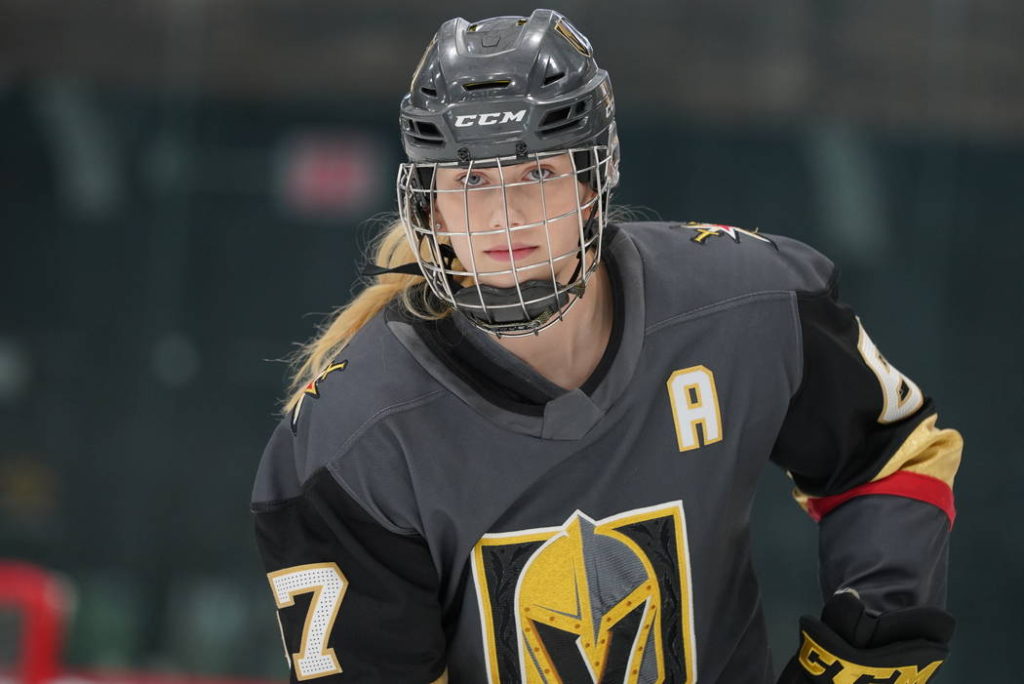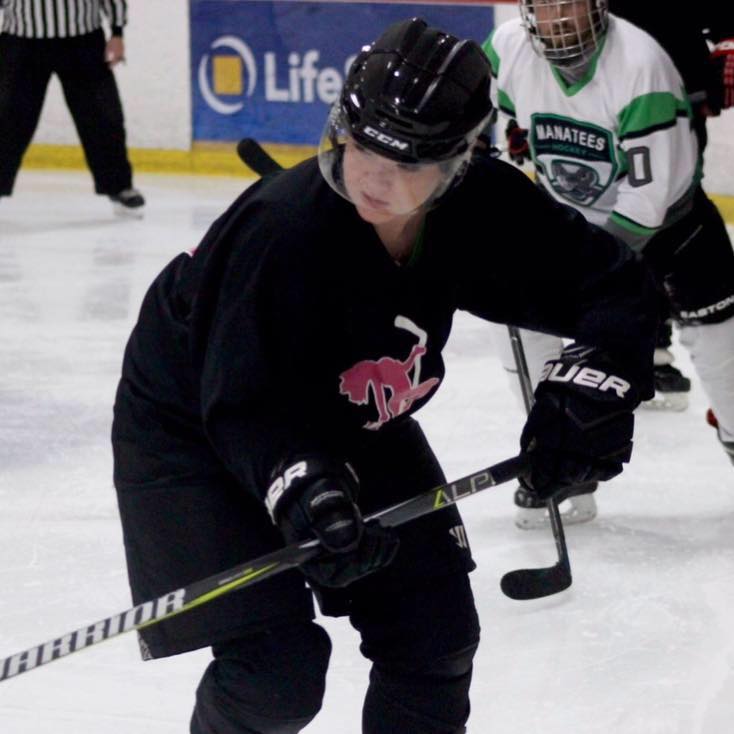
We want to first start off by congratulating Emily Kline, who was awarded the Mark Workman Scholarship for her great season playing on the Vegas Junior Golden Knights, Varsity D3 team. She held the role of alternate captain and was blessed with 3 assists in just 14 games. This was the first year that this scholarship was given. We were elated to hear that Emily will be going to play for Arizona State, where she will still play hockey. We realized how much harder she had to work to exceed the expectations just set by the industry of hockey-playing. The bar typically isn’t set very high for a woman in this field, which is why there aren’t too many female players. Whether it be on-the-ice playing, or off-the-ice reporting, women’s presence is not always felt. We know a thing or two about this topic because WE are women.
It’s typically been stated that women need to break through the glass ceiling to achieve success, but when it comes to hockey, one is also limited by the ice floor that they walk upon. We have paid extra attention over the last couple of months to women in this field (players and reporters). We did this because the women who keep VGK Ladies afloat are not hockey professionals by trade. It is rather our passion that we have turned into our jobs (sound familiar ladies?). When a person follows a passion, their potential is limitless. We see that in hockey. But it doesn’t come without an invisible badge we have to wear to have a place on the ice.
One of our VGK Ladies, April Sunga, has felt what it’s like to play hockey in such a male dominated sport. Here are some top lessons she’s learned and anecdotes from what she calls, “the BEST sport in the world”:
1. As a woman in hockey, you should play hard, but not too hard, or you’re “a man” and need a “gender check.”
2. If you aren’t the weakest player on the team, then you MUST be a man, because how in the hell could a woman actually play?
3. You shouldn’t voice an opinion, or you’re “just being a bi#$h” or my personal favorite, “on your period.”
4. You should also take unfair plays or penalties in silence, unless you want to be mocked.
5. Get used to being ignored and/or not taken seriously. I’ve heard “you’re just a girl, wtf do you know about hockey?” Literally.
When you’re a women, you have to possess Olympic-level talent to play in this sport. If you’re just a normal woman, with average ability, or an average build, then most guys will just call you trash.

Please don’t get me started on the small talk!
When talking with other guys, they will often feel the need to talk to me about other female players, but in inappropriate ways. It makes me want to rip my hair out, because this isn’t a made-for-TV movie from a Playboy article. It’s my life and I love this game. The wives or girlfriends of opposing teams (and even sometimes your own) will also discriminate against you, calling you a “slut” or saying you only want attention, and you “better stay away from” their man. Men will try to say only women complain or get their feelings hurt easily in this game, but in my experience, that’s just not true.
The Silence and the Invisible
I have played on a college age team where not a single guy, on my own team, spoke to me. I have played on a young men’s team where half of the guys didn’t speak to me, and the rest just tried to date me, or made inappropriate comments to me, ad nauseam. I’ve had guys refuse to give me ANY passes and completely ignore my presence on the ice. It doesn’t end at college-age either, it continues into “manhood.”
Even now as an adult, I have had opposing male players either completely go super easy on me, which says I am not a threat (also insulting), to guys playing extra hard against me, and trying to knock me on my ass every chance they get. They trip me and tell the ref “she can’t skate!”. Little do they know I’ve been skating for many, many moons, and am probably a better skater than a lot of the guys I face out there each time I take to the ice (that includes the ref).
Sometimes it’s ugly…and it has nothing to do with my looks!
I recently had a grown man, 6+ feet tall, on the better side of 250 pounds punch me right in the face (I was pretty grateful for that shield right about then) on the ice, because I took the puck away from him. That is a 100% true story. We were up 9-1, and I was pressuring him, and he ducked from our defenseman and right into me, where I was able to poke check the puck. Now in this instance, I’m not necessarily as indignant that he did it just because I’m a woman. It was more about our size differences: he had about a foot in height and 100 pounds on me. For you to be that big and take out your frustration on the smallest person on the ice, is just inappropriate regardless of their gender. It would have been just as messed up had I punched another girl half my size. I probably would’ve faced a penalty and gotten into serious trouble for an action like that. As a larger size female, I take this into consideration when I play against smaller women (and men). It’s not even like I was hooking him, or slashing, or having any contact really. You know why he did it? He said I was “chirping” him too much, AKA I WAS HURTING HIS FEELINGS. But women, we’re the crybabies? OY, give me a break.
Playing all of this time I’ve learned a thing or two. I’ve worked hard, and stopped taking men’s crap a while ago. I am finally on a team where I can be the only female, and I have their respect. All of them. These guys exemplify what it SHOULD feel like to be a woman in a “man’s game.” I couldn’t ask for a better team to play on. I feel respected, taken seriously, and just as valued as any of the guys.
For the first time, I don’t feel like a woman in a man’s game; I FEEL LIKE A HOCKEY PLAYER. Now I keep my head up, my feet moving, and my mouth running.
We are grateful to April for sharing her experiences so candidly. And to Emily…and to other female trailblazers in the sport, Kendell Coyne, Hillary Knight….our list can go on. What we are saying is that women can take this profession just as seriously as their male counterpart. That could be while playing OR cheering on their team. The “chivalry” presented needs to be tossed back into the dark ages, where it belongs.